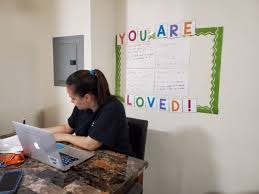Teachers remodel academic experience for virtual learning

Many teachers are going above and beyond to help students transition to a new form of learning, encouraging them to persevere through the challenges that online school brings.
October 6, 2020
Education systems worldwide have undergone major changes as virtual classrooms became the new normal within the past six months. Teachers were left scrambling to remodel their courses to fit within the frame of an electronic device screen–daily circle discussions, raised hands, and lockers were replaced with muted microphones, chat messages, and makeshift study areas. Many recognize that virtual school simply cannot compare fundamentally to the education earned through in-person learning, and that it minimizes the impact that school has on students: “I am saddened that I don’t have contact with students; you need that one on one/one on class interaction,” Chemistry teacher Maya Kempff expressed. The long hours spent at school have been replaced with frequent procrastination and limited opportunities to truly experience what high school is all about: creating connections, making memories, growing up, and preparing for future fulfillment. What struggles have teachers faced at the hands of this situation, and how can they overcome the challenges presented by this new format of education?
Learning over class calls or asynchronous assignments offers fewer chances for quality feedback from teachers; grading virtually is time-consuming and makes it more difficult to see how students respond to material, and if they are understanding their responsibilities for the class. Teachers must spend numerous hours outside of school assisting students, as well as transitioning activities and classwork into an adequate worksheet or quiz. This causes teachers to be overwhelmed by the dramatic alteration in plans: “A large obstacle we are facing is managing multiple teaching platforms each day–hybrid means we’re responsible for face-to-face and remote instruction each day–which has further diminished time for grading,” English teacher Michelle Wall explained. Students must also learn to be productive from home, surrounded by distractions from the very material teachers are working tirelessly to supply. AP Human Geography teacher Marcie Rogers advised, “If you are home, consider beginning with remote assignments as though you are actually ‘in class’ and even consider working through the remote assignments in the order of your regular school day. This will help you avoid late/missing assignments in Skyward.” Taking breaks and scheduling work times are both beneficial ways to increase productivity from home as well.
The ideology behind grading has changed for some teachers as well–as mentioned by Kempff, grading individual assignments online can be immensely time-consuming and tedious, so more assessment grading offers a second option for evaluations. English teacher Rob Hamilton, however, sees the benefit of doing more reflection-based assignments over his usual assessments so there is more class time for active discussions and unified learning. “You want students to feel challenged, but not overwhelmed. You want to assess them honestly, but also recognize that this is not a normal year,” he explained. “Many students are struggling to manage it all, and we need to be more flexible with due dates and the types of evaluations we are giving students. I’m not saying any teacher is doing it wrong; every classroom is different, but I know that my colleagues are working harder than ever to give students meaningful learning experiences and feedback.”
Not only does virtual learning replace the scholarly interactions students can have, but it also modifies the general perception of what it means to be in school. For safety reasons, students cannot mingle in classes, must remain distanced, and conversations are limited to what can be heard through a mask. Milford traditions and the way people think about attending classes are changing to keep up with the evolving times. One such example is in Rogers’ classroom, where she had previously given students a roll of Smarties before tests and quizzes as encouragement, going back to the year 1996. “This year, with safety protocols, students won’t receive Smarties,” she shared. “I guess an image of Smarties on our Smartboard kind of sends an encouraging vibe, but definitely not the same as an actual roll of the sweet treat.” Though this is just one small issue on a large scale phenomenon, it makes a difference for the normal experience students once received. In general, when students have fewer fun things to look forward to with peers that inspire them to persevere through academic challenges to reap the rewards, they will be less motivated to excel in school.
Both students and teachers must be able to accept the mistakes that each makes in general, but it is particularly important this school year with the numerous changes to teaching curriculums, and how it will be received by at-home learners. “Not many people realize how difficult it is to put lessons together to be learned over a screen–it takes many hours longer,” Kempff said. “Students have been patient, regardless of the challenges.” MHS students have been determined to make the best of the situation and oftentimes are struggling in similar ways to the teachers–the technology is new for everyone, and part of adapting is to be resilient and patient with the people involved in the process. Hamilton, like many staff members, is working to aid students’ mindsets by lifting their spirits and willingness to accept the changes as they come: “There will be an end to this and that the world we create after COVID will be better than the one that we lived in before. Ultimately, if you continue to work hard and try to better yourself, you will be successful,” he stated. “Everyone is in the same boat right now and we are all floating down this rough and unknown stream, but eventually we will find calmer waters and be more equipped to handle other obstacles in our lives.”